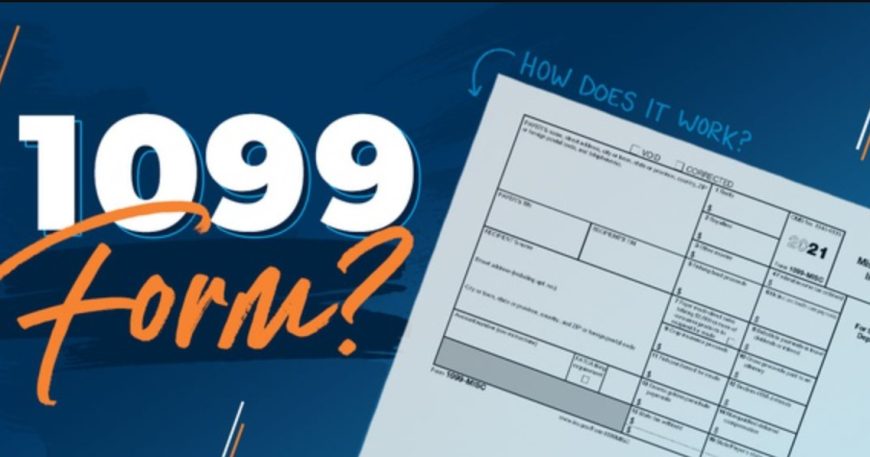Introduction:
In the realm of tax documentation, 1099 forms play a pivotal role. Aims to demystify 1099s, providing a comprehensive understanding of what they are, 10 crucial facts about them, the diverse types available, and who should receive these essential tax documents.
Section 1: What Are 1099 Forms?
Definition and Purpose:
Introduce 1099 forms as crucial tax documents businesses issue to report various types of income, not just wages.
Independent Contractor Payments:
Highlight the primary use of 1099s in reporting payments made to independent contractors, emphasizing their role beyond traditional employee earnings.

Section 2: 10 Things You Should Know About 1099s
Different Types for Different Incomes:
Discuss how there are various types of 1099s, each designated for specific types of income, creating a nuanced tax reporting system.
Thresholds for Issuance:
Explore the thresholds that trigger the issuance of 1099 forms, emphasizing the importance of accurate reporting for businesses and recipients.
Tax Reporting Deadlines:
Highlight the significance of adhering to tax reporting deadlines associated with 1099 forms to avoid penalties and ensure compliance.
Taxable Income Categories:
Discuss the various types of income that 1099 forms can cover, such as interest and dividends, rental income, and freelance earnings.
IRS Matching System:
Explain how the IRS utilizes a matching system to cross-reference reported income on 1099 forms with individual tax returns, ensuring accuracy.
Electronic Filing Options:
Explore the electronic filing options available for businesses issuing 1099s, promoting efficiency and reducing paperwork.
Penalties for Non-Compliance:
Emphasize the potential penalties for businesses failing to issue 1099 forms when required, underscoring the importance of compliance.
Correcting Errors on 1099s:
Discuss the process for correcting errors on 1099 forms, guiding businesses to rectify inaccuracies promptly.
Role in Business Tax Deductions:
Highlight the role of 1099 forms in business tax deductions, illustrating how accurate reporting impacts businesses and individual taxpayers.
Filing Requirements for Recipients:
Inform recipients about their responsibilities in reporting 1099 income on their tax returns, ensuring full compliance with tax regulations.
Section 3: Exploring the Many Types of 1099s
1099-INT (Interest Income):
Introduce the 1099-INT form, emphasizing its use for reporting interest income earned from various financial accounts.
1099-DIV (Dividend Income):
Discuss the 1099-DIV form for reporting dividend income from investments, stocks, or mutual funds.
1099-MISC (Miscellaneous Income):
Explore the versatile 1099-MISC form, which is used for reporting various types of miscellaneous income, including payments to independent contractors and rent.
1099-K (Payment Card and Third-Party Network Transactions):
Introduce the 1099-K form to report income received through payment cards or third-party networks.
1099-G (Government Payments):
Discuss the 1099-G form for reporting government payments such as unemployment compensation and state tax refunds.
1099-R (Retirement Distributions):
Explore the 1099-R form for reporting retirement accounts, pensions, or annuities distributions.
1099-S (Real Estate Transactions):
Introduce the 1099-S form for reporting proceeds from real estate transactions, ensuring accurate documentation of property sales.
1099-C (Cancellation of Debt):
Discuss the 1099-C form, used for reporting canceled debt, highlighting its importance in tax reporting for individuals facing debt forgiveness.
1099-B (Brokerage Transactions):
Explore the 1099-B form, designated for reporting proceeds from brokerage transactions, providing a comprehensive overview of investment gains and losses.
1099-NEC (Non-employee Compensation):
Highlight the 1099-NEC form, specifically designed for reporting non-employee compensation, simplifying the process of reporting payments to independent contractors.
Section 4: Who Should Receive a 1099 Form?
Independent Contractors and Freelancers:
Emphasize that independent contractors and freelancers are the primary recipients of 1099 forms, as businesses report payments for services rendered.
Interest and Dividend Recipients:
Discuss how individuals receiving interest and dividend income from financial accounts and investments should expect to receive 1099-INT and 1099-DIV forms.
Real Estate Sellers:
Inform real estate sellers that they may receive a 1099-S form if they have engaged in property transactions, ensuring accurate proceeds reporting.
Retirees and Pension Recipients:
Discuss how retirees and pension recipients should anticipate receiving 1099-R forms and reporting distributions from retirement accounts.
Government Payments and Unemployment Recipients:
Highlight that individuals receiving government payments, such as unemployment compensation, should expect to receive a 1099-G form.
Debt Forgiveness Beneficiaries:
Inform individuals who have experienced debt forgiveness that they may receive a 1099-C form, reporting the canceled debt as taxable income.
Investors and Brokerage Account Holders:
Discuss how investors and brokerage account holders should anticipate receiving a 1099-B form reporting proceeds from brokerage transactions.
Payment Card and Network Transaction Participants:
Emphasize that individuals participating in payment card and third-party network transactions may receive a 1099-K form reporting their income.
Non-employee Compensation Recipients:
Discuss that individuals providing services as independent contractors should expect to receive a 1099-NEC form reporting their non-employee compensation.
Conclusion:
In conclusion, 1099 forms are integral to the tax landscape, capturing diverse income streams and facilitating accurate tax reporting. This comprehensive guide has explored what 1099 forms are, provided 10 critical facts about them, delved into the various types available, and identified the individuals who should anticipate receiving these essential tax documents. Understanding the nuances of 1099 forms becomes crucial for businesses and individuals as tax regulations evolve, ensuring compliance and accurate reporting in the ever-changing tax environment.




